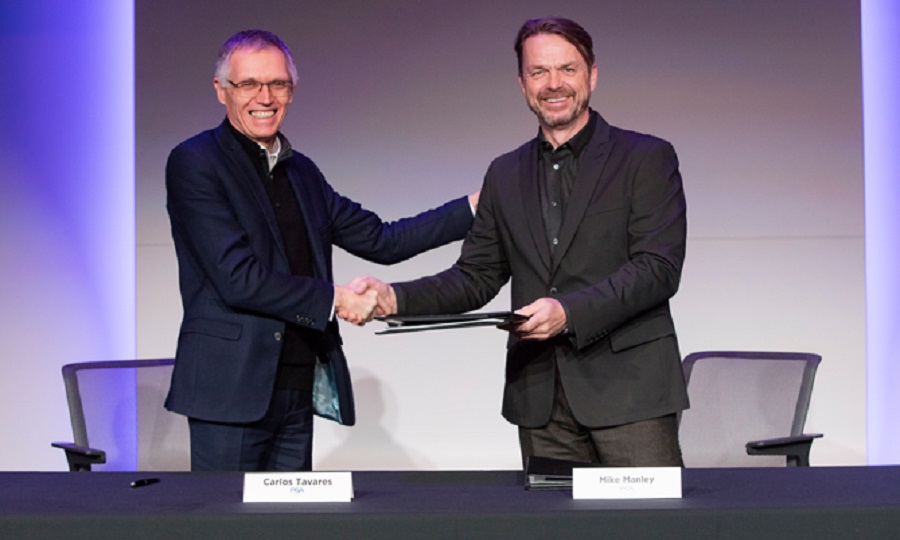Fiat Chrysler Automobiles and PSA Group have signed a binding merger agreement in a deal that will reshape the global car industry.
The combined company will be led by PSA CEO Carlos Tavares, with FCA Chairman John Elkann holding the same role at the enlarged company, the companies said in a statement on Wednesday.
The merger will create the world’s fourth-largest automaker with a stock-market value of about $47 billion. The tie-up also brings together two carmaking dynasties- the billionaire Agnelli clan of Italy, led by Elkann, and the Peugeots of France.
PSA and FCA said the new company will have an 11-person board, with five members nominated by PSA and another five by FCA. This will include labour representatives from both companies. As part of the deal, no shareholder would have the power to exercise more than 30 per cent of the votes cast at shareholders’ meetings.
Tavares, 61, will become CEO of the merged entity for an initial five-year term and will have the 11th seat on the board.
In a letter to FCA employees, Elkann said he was “delighted” that the combined group would be led by Tavares. “And Mike Manley, who has led FCA with huge energy, commitment and success over the past year, will be there alongside him,” he said. He did not say what position Manley would hold. Manley, 55, took over at FCA last year after the sudden death of industry legend Sergio Marchionne.
Tavares said the merger will place PSA and FCA in a strong position. “The challenges of our industry are really, really significant,” Tavares told reporters on a call on Wednesday. “The green deal, autonomous vehicles, connectivity and all those topics need significant resources, strengths, skills and expertise.”
By merging, PSA and FCA aim to achieve annual cost savings of 3.7 billion euros ($4 billion).
Technology-sharing as well as product- and platform-related savings are expected to account for about 40 per cent of the annual synergies, the companies said. Purchasing will represent a further estimated 40 per cent, benefiting principally from scale and best-price alignment. Other areas, including marketing, IT, general and administrative, and logistics, will account for the remaining 20 per cent.
The synergy estimates are not based on any plant closures, the companies said.
With brands including Jeep, Dodge, Ram, Chrysler, Alfa Romeo, Maserati and Opel, the automakers sold a combined 8.7 million vehicles last year.
The companies have yet to spell out precisely how they plan to tackle potential excess capacity, and which car platforms they will focus on, only detailing that a majority of production volume would be concentrated on PSA’s compact/mid-size platform and small platform.
“At this stage, nothing is decided. We have been evaluating the opportunities,” Tavares told reporters.
The two automakers said they would come up with a name for the merged company over the coming months.
Completion of the proposed combination is expected to take place in 12 to 15 months, including approval by both companies’ shareholders at extraordinary shareholder meetings.
Before the merger is completed, one of PSA’s shareholders, China’s Dongfeng Motor Group, will trim its 12.2 per cent stake in the French automaker by selling 30.7 million shares to PSA. The stake was worth 679 million euros ($748.4 million) at the most recent closing price, and Dongfeng will have 4.5 per cent of the merged group.
Dongfeng’s smaller stake is seen as helping the deal gain regulatory approval in the United States. U.S. economic adviser Larry Kudlow said last month the Trump administration intends to review the proposed merger because of the Chinese automaker’s stake in the combined company.
“This is the way of supporting this merger and making sure we don’t have bumps on the road,” Tavares said.
Deal benefits
The deal will give PSA a long-sought presence in the U.S. and should help FCA gain ground in developing low-emission technology, where it has lagged rivals. Yet the company will still be heavily reliant on Europe’s saturated auto market, and poorly positioned in China, the world’s largest country for car sales.
FCA will gain access to PSA’s more modern vehicle platforms, helping it meet tougher new emissions rules, while Europe-focused PSA will benefit from FCA’s profitable U.S. business that features brands such as Ram and Jeep.
Tavares, who is known as a hard-nosed cost-cutter, will have to navigate the political crosscurrents in France, Italy and the U.S., where the automakers have deep national roots. Tavares led PSA back from the brink after taking over in 2014 and revived the money-losing Opel brand after acquiring it from GM two years ago.
Ahead of the deal closing, FCA will pay its shareholders a 5.5 billion euro special dividend.
The merged group’s 8.7 million annual vehicle sales would put it behind Volkswagen Group, Toyota Motor and the Renault-Nissan alliance.
Reuters and Bloomberg contributed to this report
Sign in
Welcome! Log into your account
Forgot your password? Get help
PRIVACY POLICY PAGE
Password recovery
Recover your password
A password will be e-mailed to you.












